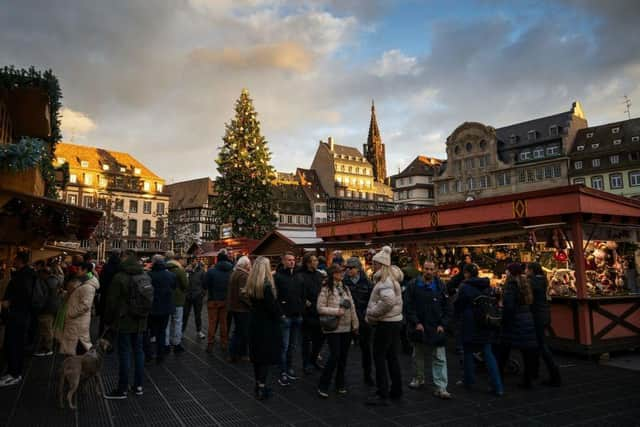Why are Christmas markets targeted by terrorists? German plot involving teenage boys revealed
For me, Germany is synonymous with Christmas. My school had an exchange partnership with one in northern Germany - and each year in mid-December, our choir would travel there to perform a Christmas concert with their band.
Our exchange town in Werther – yes, home to the factory making the iconic sweets, Werther’s Originals – is a storybook-perfect Christmas town right out of a Brothers Grimm fairytale. There was usually snow, flakes falling on our heads as we left a concert venue, while the German carols felt familiar, yet exotic at the same time.
Advertisement
Hide AdAdvertisement
Hide AdBut what made it was the Christmas markets. Towns all around the region hosted them. Tiny wooden huts, selling cinnamon-spiced biscuits, heavy-sweet Gluhwein of the alcoholic and non-alcoholic varieties and delicate wooden Christmas tree ornaments. Brass bands played Christmas music.


Back then, the traditional markets were still mainly confined to mainland Europe – and mainly Germany. Now, of course, they have become commercial money-spinners, with thousands of people crammed in to a tiny space where they can pay £10.50 for a plate of chips.
In Germany’s North Rhine-Westphalia region, police this week foiled a targeted plot to attack a Christmas market. The suspects behind the alleged planned attack were two teenage boys. It is not known how serious the plans were, or if they would have been actually carried out. However, the specific nature of the threat – a time, place and date had apparently been selected – made it necessary to act.
It is the latest in a string of threats or actual attacks carried out around Christmas markets in recent years. In December 2016, a truck was deliberately driven into the Christmas market at Breitscheidplatz in Berlin, leaving 12 people dead and 56 others injured. Two years later, five people were killed and 11 injured during a terrorist attack on the Christmas market in Strasbourg, France.
Meanwhile, in November 2021, a man drove an SUV through the annual Christmas parade in Waukesha in the US state of Wisconsin, killing six people and injuring 62 others.
What is it about Christmas markets which make them such a regular target? Details from previous attacks have suggested the terrorists involved were not always wedded to targeting a market, with other locations considered. Yet many have eventually returned to the markets.
The fact they are held ostensibly to celebrate Christmas makes them a symbol of western, modern Christianity – in theory. In practice, they have little to do with the religious side of Christmas these days, but the concept undoubtedly still holds.
Another factor is probably due to them being a location densely packed with people, but no more so than a gig, sports match or a protest march.
Advertisement
Hide AdAdvertisement
Hide AdThe latest threat in Germany comes as Thomas Haldenwang, the head of the country’s domestic intelligence, warned the risk of Islamist militant attacks was "real and higher than it has been for a long time" due to heightened tensions linked to the war between Israel and Hamas.
Security authorities have said over the years they believe Christmas markets will continue to be targeted. Many are now protected with concrete barriers and armed policemen, which somewhat detracts from the festive spirit – but is, sadly, perhaps necessary.
Comments
Want to join the conversation? Please or to comment on this article.
